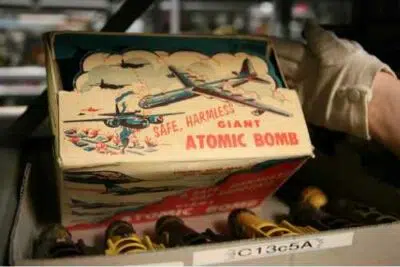
“[W]estern officials said that a nuclear strike against Ukraine would be unlikely to spark a retaliation in kind but would instead trigger conventional military responses from western states to punish Russia.”
Political analyst Josh Trevino wrote that the Biden Administration has told the Russians that, for the first time in our history, Russian nuclear-weapons use in Europe will not guarantee an American nuclear response. Instead of a nuclear attack in return, the Administration believes that “conventional military responses” will be sufficiently deterring.
He told the world that Russia could nuke Ukraine without being met with equal force. That warning has always been the deterrence. Biden took it off the table. Referencing that, some of Josh Trevino’s analysis follows.
This is a passage from Josh Trevino’s analysis of this:
It is a passage so astonishing that I re-read it multiple times, and within the next twenty-four hours made several phone calls to confirm. Here is what was, in aggregate, communicated to me: the passage is broadly accurate. As explained, the Biden Administration really has told the Russians that, for the first time ever, Russian nuclear-weapons use in Europe will not guarantee an American nuclear response. Instead of a nuclear attack in return, the Administration has persuaded itself that “conventional military responses” will be sufficiently deterring. Supposedly — and you ought to consider this very much unconfirmed and uncorroborated — those responses will include NATO attacks on Russian launch sites, plus a NATO-enforced no-fly zone over Ukraine. The latter is functionally indistinguishable from direct NATO entry into the war on the Ukrainian side, and there should be no illusion about it.
Again, you ought to regard the preceding two sentences with rational skepticism: I cannot confirm any of it. Nevertheless there is enough here to profoundly alarm. This much is public and reported: the Biden Administration has abandoned the tried-and-true mechanism of nuclear deterrence, and the tenets of well-established escalation-dominance theory, in favor of a novel and untried theory of conventional deterrence of nuclear escalation. This novel theory rests upon the premise that the Russians dread most a loss of the war in Ukraine, which presumably NATO airpower plus Ukrainian armies will guarantee. In short: use a nuke, lose the war.
This may or may not be true of the Russian state. It is not true of the Russian regime. The regime’s imperative, remember, is to survive. The state is already visibly losing the war in Ukraine — it is obvious within Russia itself, as the quarter-million or so who have fled the country since mobilization will attest — and it is plausible that the regime, being directly responsible, will pay the bill. In that light, what is the rational course for that regime now?
Well, consider the regime’s own narratives: not just that Ukraine is properly Russian, but that the assembled West is Russia’s enemy. The latter is reasonably powerful, and reasonably unifying. There are plenty of Russians who believe it, and they are not all themselves irrational on this count. Now, no doubt to the immense surprise of the dictator himself, a message arrives from the Americans: you may use nuclear weapons, and we will not respond in kind. Astonishing, fantastic, unbelievable. A gift in full. But, continue the Americans, we will enter the war and help drive you from Ukraine. We will even show how serious we are by leaking this message to the Financial Times.
This, all at once, presents Vladimir Putin with something he has not had since the war began on 24 February. Abruptly, amazingly, he has an off-ramp from the colossal strategic error that is the Ukrainian war. All he has to do is detonate a nuke. The weapon is used — no doubt on the pretext that the recent sham referenda have made the Donbas “Russian” territory, now under “foreign” attack — NATO enters the war, and Russia more or less leaves Ukraine after a sufficient bloodletting. Here is the dictator’s narrative then: we made good on our threats, on our strength, to use our atomic weapons. The West was too frightened of our resolve to reply in kind. Behold, we held them off. They dare not pursue us. It is not an implausible basis for regime survival: an undeserved rescue, to be sure, but a rescue nonetheless.
Do you agree with the analysis?




A study of the use of their Tactical Nukes on mobile tank platforms is interesting. They will use them in a first strike situation. Large air wing coming in, not anymore. These are Hiroshima size small but effective as the world knows. We resisted building these mid range tactical nukes for years up to 2019 . Trump noticed this was… Read more »
With the Sabotage of NORD, Europe is pretty much screwed and can’t really retaliate. Europe has much bigger problems for at least the next 6 to 8 Months, like not freezing to death. Shuttling down American Energy Production has put us in the position of not being able to provide significant help to Europe and any aid to Europe will… Read more »